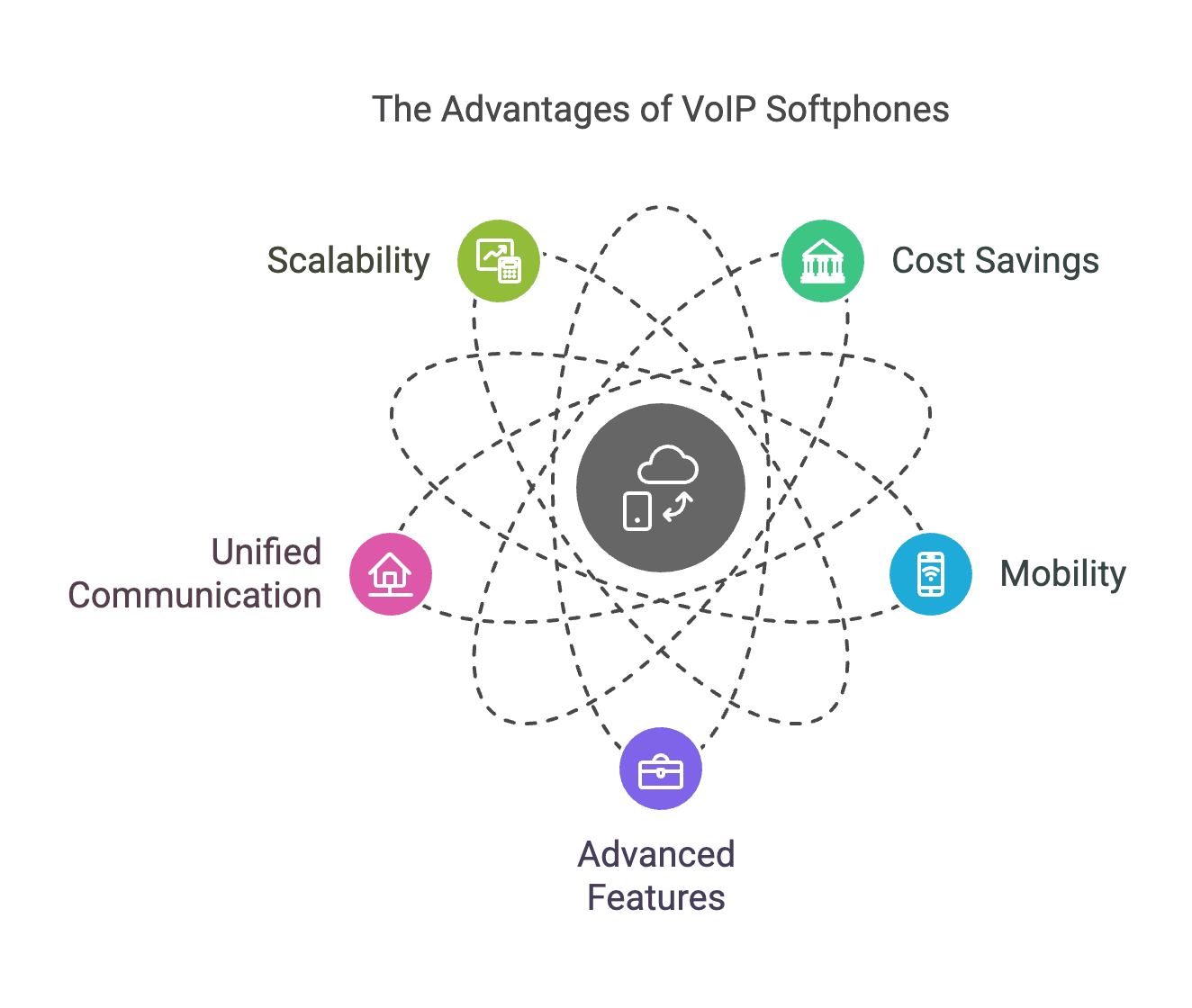When it comes to keeping your team connected and productive, communication tools can either make your life easier or create unnecessary headaches. That’s where a VoIP softphone steps in—a sleek, software-based solution that replaces traditional desk phones and brings all your calls, messages, and collaboration tools into one place.
Whether you’re managing remote teams, handling customer service, or running a sales department, choosing the right softphone system is more than a technical decision—it’s about finding a solution that supports your workflow and helps your team succeed. But with so many options out there, how do you make the right choice? This guide will walk you through everything you need to know about choosing the ideal softphone system for your business.
Understanding VoIP Softphones
Before diving into the nitty-gritty of how VoIP softphones operate, let’s start with the basics: what makes them different from traditional phones and why they’ve become such an essential tool for modern businesses.
How VoIP Softphones Work
First things first—what exactly is a softphone application? The term “softphone” refers to software that turns any device—laptop, smartphone, or tablet—into a fully functioning phone. Powered by VoIP (Voice over Internet Protocol) technology, it allows you to make and receive calls over the Internet rather than traditional phone lines.
But that’s just the beginning. A great VoIP softphone integrates seamlessly with other tools, like CRMs, project management platforms, and analytics software. With solutions like CloudCall, you can view client data, manage calls, and track interactions—all from one screen.
Key Benefits of VoIP Softphones
Why are businesses around the world switching to softphone software? Here are some compelling reasons:
1. Cost Savings
Switching to a VoIP softphone is a budget-friendly choice that can save your business significant money over time. Traditional phone systems come with high installation fees, maintenance costs, and hardware expenses, not to mention sky-high rates for international calls. With a softphone system, you only need an Internet connection and compatible devices to start saving.
What’s more, many softphone applications offer flexible subscription plans, letting you pay for exactly what you need without getting locked into expensive contracts. These savings can then be reinvested in other areas of your business, like marketing, training, or growing your team.
2. Mobility
Gone are the days when your business communication was tied to a desk. With a softphone app, you can stay connected no matter where you are—whether you’re working from home, traveling for a client meeting, or taking a break at your favorite coffee shop. Mobility is especially valuable for remote teams or businesses with multiple office locations, as it ensures everyone stays in sync.
3. Advanced Features
A VoIP softphone is more than just a tool for making calls. It’s designed to handle a range of tasks that help businesses stay organized and productive. Features like call recording allow you to revisit important details from client conversations, while voicemail-to-email ensures you always stay on top of messages.
With real-time analytics, you can track metrics like call volumes, response times, and team performance. These insights provide the data you need to refine processes and improve overall communication efficiency.
4. Unified Communication
Imagine having all your calls, messages, and video conferences in one place. A softphone system brings everything together, reducing the need to jump between multiple platforms. This not only saves time but also creates a smoother experience for both your team and your clients.
For example, with CloudCall’s seamless integration, you can pull up a client’s CRM profile during a call, giving you instant access to their history, preferences, and notes. This level of personalization can make a big difference in building stronger relationships and closing deals.
5. Scalability
Your business is growing, and your communication tools should grow with you. A VoIP softphone makes it easy to scale up (or down) as needed. Adding new users, upgrading features, or expanding to new locations is a breeze compared to traditional phone systems, which often require expensive hardware updates.
Common Use Cases
Still wondering if a softphone system is right for you? Consider these use cases:
1. Remote Work
In the age of hybrid and remote work, staying connected is more important than ever. A softphone system ensures your team has access to reliable communication tools no matter where they are. Remote employees can make and receive calls, join video conferences, or message team members seamlessly, fostering collaboration regardless of the physical distance.
2. Customer Support
Customer service teams deal with high call volumes, often under tight deadlines. A VoIP softphone can make their lives significantly easier. Call-routing features ensure customers are connected to the right department, reducing wait times and frustration.
3. Sales Teams
For sales professionals, every call is an opportunity to build rapport, nurture leads, or close deals. A softphone app makes this process smoother by integrating with CRMs to give reps instant access to client information. This empowers sales teams to personalize their approach and build trust, which can make all the difference in securing a deal.
4. Small Businesses and Startups
Small businesses often have to make do with limited resources. A softphone application is a cost-effective solution that provides enterprise-level communication tools without the hefty price tag. Startups, in particular, benefit from the scalability of a VoIP softphone, allowing them to add features and users as they grow.
5. Multi-Location Teams
For businesses with offices across multiple locations, a softphone system ensures everyone stays connected without the need for expensive infrastructure. Employees in New York, London, and Sydney can collaborate as if they’re sitting in the same room, thanks to tools like video conferencing and team chats.
Key Features to Consider
When shopping for a VoIP softphone, it’s all about the features. Here’s what to keep an eye out for:
1. Call Management Tools
Your softphone software should come with powerful call management features like call forwarding, auto-attendants, and voicemail-to-email. These tools make handling high call volumes easier and more efficient.
2. Collaboration Features
Modern businesses thrive on teamwork. Look for features like video conferencing, team chats, and file sharing to foster better collaboration.
3. Cross-Platform Compatibility
A great softphone app works wherever you do. Whether you’re on a desktop, smartphone, or tablet, the system should adapt to your needs.
4. Integration Capabilities
Does the app work with your existing tools? Solutions like CloudCall stand out here, offering seamless CRM integration that helps you unify communication with customer data.
5. Security and Reliability
Security isn’t optional. To protect your data, choose a softphone application that prioritizes encryption, secure protocols, and uptime guarantees.
Steps to Choose the Best VoIP Softphone
Finding the right business softphone really isn’t as daunting as it seems. Here’s a step-by-step guide:
1. Assess Your Needs
Think about your team’s size, workflows, and must-have features. Are you looking for mobility? CRM integration? Advanced analytics? Pinpointing your priorities will make narrowing down options much easier.
2. Set a Budget
A VoIP softphone is an investment, but it doesn’t have to break the bank. Consider both upfront costs and ongoing subscription fees to find a solution that fits your financial plan.
3. Research and Compare Providers
There’s no shortage of options, but not all providers are created equal. Take a look at reviews, compare features, and look for case studies.
4. Test Before You Commit
Free trials and demos aren’t just helpful—they’re essential. Test different tools to see how they fit into your daily operations.
Common Pitfalls to Avoid
Even with the best intentions, it’s easy to make mistakes when choosing a VoIP softphone. Here are the most common pitfalls and how to avoid them:
1. Overlooking Scalability
Choosing a system that fits your current needs but doesn’t grow with your business is a recipe for disaster later. Always ensure your softphone software can scale with your team as it expands.
2. Neglecting Integration Needs
If your softphone app doesn’t work seamlessly with your existing tools—like CRMs or analytics platforms—you’ll waste time and effort. Prioritize integration to keep everything running smoothly.
3. Ignoring Security Features
Security isn’t optional. Weak encryption or unsecure protocols can put your business at risk. Look for strong encryption and a track record of reliability.
4. Focusing Too Much on Cost
Going for the cheapest option often means sacrificing essential features or support. Instead, focus on the overall value and long-term benefits of the system.
5. Skipping Free Trials or Demos
You can’t fully assess a system without testing it. Free trials and demos help you evaluate usability, features, and compatibility before committing.
6. Underestimating Training Needs
Even the best tools are useless if your team doesn’t know how to use them. Invest in training to ensure everyone is comfortable and confident with the new system.
To sum up, choosing the best VoIP softphone doesn’t have to be overwhelming. With a clear understanding of your needs, a focus on essential features, and a bit of research, you can find the perfect solution for your business. Whether it’s saving money, improving mobility, or streamlining workflows, the right softphone app can truly transform the way you communicate.




































